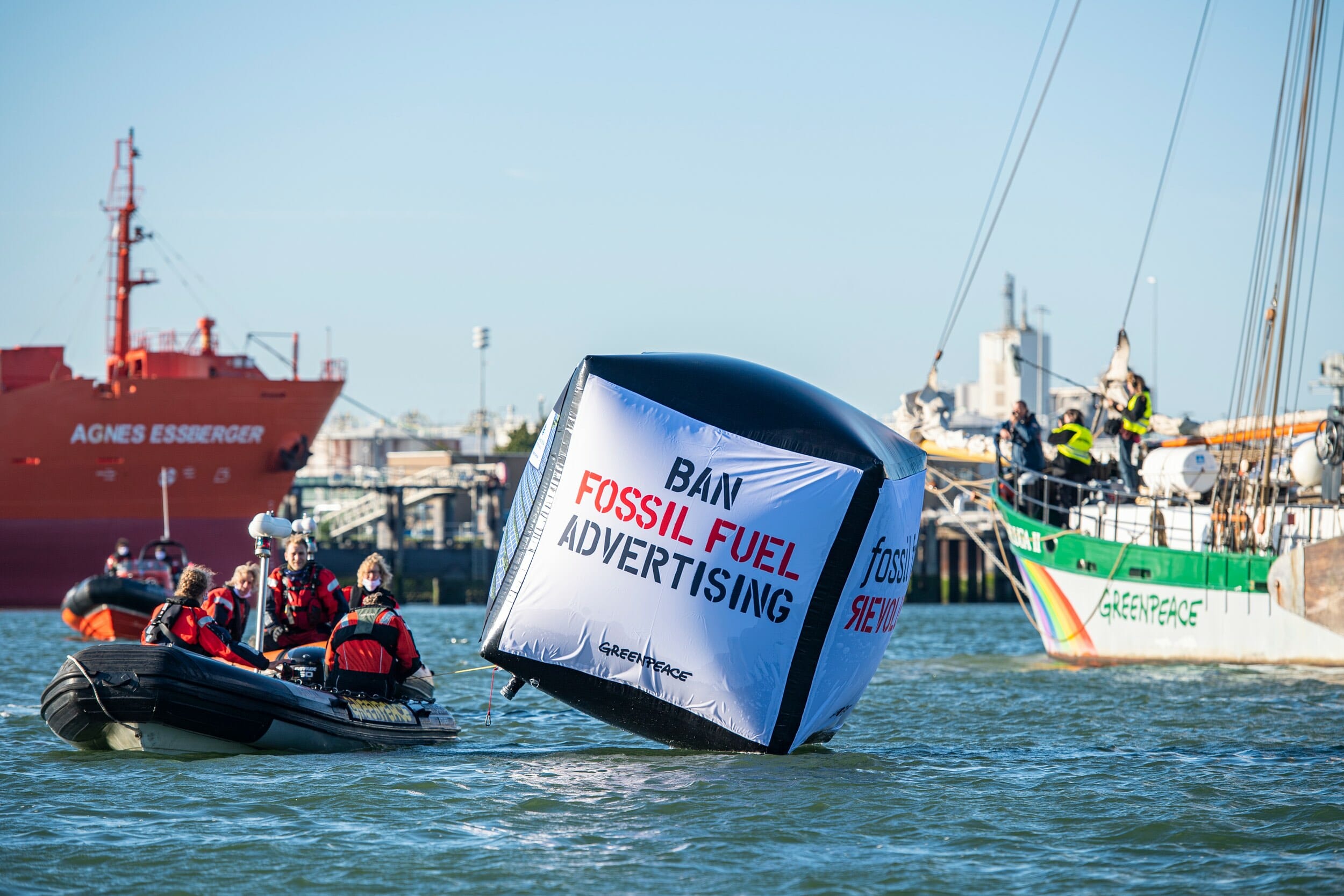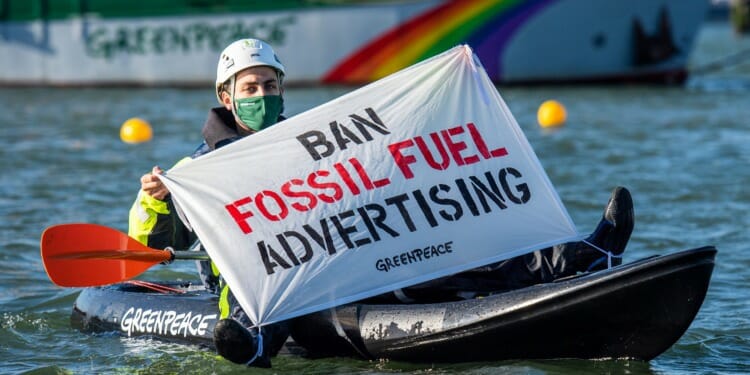Throughout Monday to Tuesday, 80 activists from twelve EU countries blocked traffic around Shell’s Pernis refinery – the largest in Europe – as part of a campaign seeking a ban on fossil fuel adverts. Protesters anchored the 33-meter-long vessel Beluga II in front of the entrance to Tweede Petroleumhaven, where Shell’s refinery is located, using kayaks, canoes, and inflatable boats to form a second blockade on the water. Several other protesters built a barrier on the water with fossil fuel ads that were used by petroleum companies in Europe and deemed as “greenwashing.”
Greenpeace and more than 20 other environmental groups are backing the Ban Fossil Fuel Ads campaign, seeking a million signatures for a European-wide ban on adverts and sponsorships by oil and gas companies. They are calling for the European commission to propose an EU Legislative Act that would include prohibition of advertisements from any corporations active in the market for fossil fuels, particularly by extracting, refining, supplying, distributing, or selling fossil fuels.

They are hoping for the EU to pass a ban similar to the one previously implemented on cross-border tobacco products adverts. In the same way that tobacco companies undermined warnings about the health risk of their products in their ads, activists argue that fossil fuel companies use advertising and sponsorship as a smokescreen to downplay their direct and indirect involvement with the climate and human rights crises. Dismissing their adverts as “greenwashing,” given that European-based fossil fuel companies are some of the top 20 most carbon polluting fossil fuel companies in the world.
First the fossil fuel companies lied and denied the science that said they were causing a #ClimateCrisis
Now they use ads and sponsorships to distract and delay climate action, pretending they have they solutions
It's time to #BanFossilAdshttps://t.co/MSfBSHEQYB
— Greenpeace EU (@GreenpeaceEU) October 4, 2021
An investigation commissioned by Greenpeace, and researched by environmental news outlet DeSmog, assessed over 3,000 ads published on Twitter, Facebook, Instagram and Youtube, by Shell, Total Energies, Preem, Eni, Repsol and Fortum.
The report found that there was a “distinct discrepancy between the number of adverts and promotions focussing on ‘green’ activities, and the amount of their portfolios that appear to be dedicated to ‘green’ technologies”.
The authors of the research also looked out for companies presenting “false solutions” for credit.
A false solution is a “climate solution presented by governments or companies that has either been proved to be actively harmful to the planet and or communities, or is so severely under researched or developed that it cannot be seen as a substantial alternative to renewable energy technologies.”
Related Articles: Victory for Climate Movement: Oil Giant Shell Condemned by Dutch Court | Science Museum Faces Protests Over Decision to Accept Shell as Sponsor of Fossil Fuel Exhibit
The study found that 63% of those ads amounted to greenwashing, misleading consumers by failing to accurately reflect the companies’ actual business and promoting false solutions such as fossil gas as clean energy.
The largest discrepancy was for Preem whereby 81% of the advertisements that were reviewed promoted “green” technologies or false solutions.
Yet only 1% of Preem’s portfolio is dedicated to non-fossil-fuel energy.
Why Focusing on Shell?
Shell is one of the most polluting companies in the world, and one of the world’s largest fossil fuel companies.
According to their 2021 Q2 report, Shell is investing $16 and $17 billion in oil and gas this year. Meanwhile, only $2-3 billion will be devoted to renewable energy.
The company has found itself in several disputes with the Dutch court. Earlier in the summer, a ruling ordered the oil company to slash its carbon pollution by 45% by 2030 – a decision the company is appealing.
Amnesty International has, also, called on governments to investigate Shell for three ongoing legal cases, which questions Shell’s complicity in unlawful arrest, detention, and execution, or seek compensation for oil spills and for systemic ongoing oil pollution.
Furthermore, the report by DeSmog found that the proportion of greenwashing adverts (81%) from Shell was almost exactly the same as the proportion it invests in fossil fuels (80%). Whilst other research has shown that the industry has long used ads and other marketing strategies to maintain its social license.
Evidently, industries active in the market for fossil fuels continue to plunge us deeper into climate and human rights crises. They affect human rights, namely people’s right to life, food, adequate housing and water, sanitation, and health. As the climate emergency worsens, we can expect increasing deaths, hunger, and displacement.
This raises an important question: do they deserve a public platform to advertise at all?
Editor’s Note: The opinions expressed here by Impakter.com columnists are their own, not those of Impakter.com.










